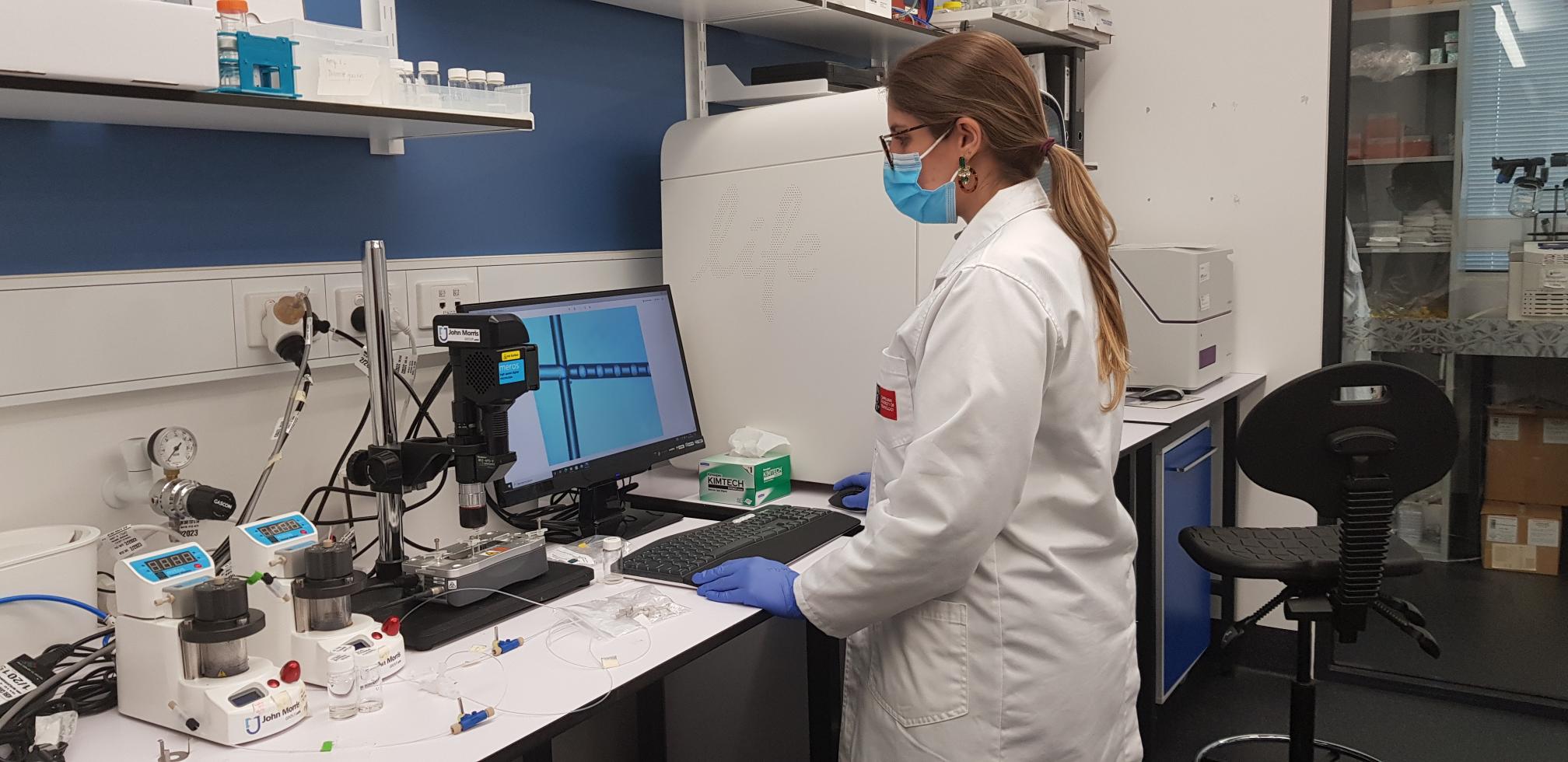A $7 million grant to grow stem cell research

Researchers will use the BioFab3D lab to develop a bioreactor system to expand the number of stem cells they'll be able to use to repair and replace damaged or missing cartilage
In summary
- Swinburne is part of a project that has received a $7 million Medical Research Future Fund grant
- The team will develop novel cartilage-based stem cell therapies that will change the way we care for people living with painful joint disease and facial disfigurement
- Professor Simon Moulton will lead the Swinburne team, building on years of research into developing innovative cartilage repair strategies
Swinburne University of Technology has received a share of a $7 million Medical Research Future Fund grant to develop first-of-its-kind Australian research to allow live stem cells to be 3D printed and used in treatments.
The cross-institutional research team will develop novel cartilage-based stem cell therapies that will change the way we care for people living with painful joint disease, such as osteoarthritis, and facial disfigurement.
More than two million Australians live with the painful and degenerative joint disease, osteoarthritis, and one in 2,000 newborns are born with microtia – an absent or poorly formed ear – which can lead to hearing loss, speech and literacy delays.
This research could actually restore damaged or absent cartilage, transforming how these conditions are treated and vastly improving quality of life for sufferers.
It will use technology to revolutionise the way we think about personalised care, patient involvement and scientific advancements.

Cartilage, like that pictured, is a flexible connective tissue that protects our joints and bones
A plan to grow cartilage using stem cells
This ambitious project builds on many years of previous research, including at Swinburne.
In the initial stages, the five-year project will focus on the technologies used to take live stem cell printing from research labs into clinical settings. The team will then proceed to clinical trials to prove the efficacy of the solution.
Led by University of Melbourne Professor Peter Choong, the researchers also hope to simplify processes to bring these treatments into hospitals so that clinicians can treat conditions more quickly, with fewer complications than before.
In addition to Swinburne and the University of Melbourne, the research team also includes experts from La Trobe University, St Vincent’s Hospital Melbourne, University of Wollongong, University of Sydney, Royal Prince Alfred Hospital, Monash University, RMIT and the University of Toronto.
Swinburne brings technology and people to the project
Swinburne will develop a bioreactor system using its patent-protected materials, which allow stem cells to be expanded to large numbers that can be used to repair and replace damaged or missing cartilage.
Expert in biomedical electromaterials science, Professor Simon Moulton, will lead the Swinburne team.
“This grant allows us to continue the work we have already been doing with the other partners over many years in developing innovative cartilage repair strategies,” says Professor Moulton.
“As a materials engineering researcher in the medical area, we do not always have the opportunity to translate our efforts from fundamental research into a clinical human solution. The $7 million of total grant funding will allow us to continue to develop the stem cell technology towards clinical translation that will provide benefit to a wide range of patients.”
-
Media Enquiries
Related articles
-

- Technology
- Science
- Engineering
Victorian students drive green energy transition through international hydrogen competition
Swinburne’s KIOSC, in collaboration with Horizon Educational and Gippsland Tech School, co-hosted the Hydrogen Grand Prix in Melbourne.Friday 26 July 2024 -

- Science
Skin, scales and fish tails: using collagen to turn fish guts into gold
New research from Swinburne could transform the sector by converting high value collagen proteins from seafood by-products into cosmetics, food, and pharmaceuticals.
Tuesday 02 July 2024 -

- Science
- Engineering
Submarines in the future could self-identify cracks and self-heal thanks to Swinburne researcher
Thanks to the work of Dr Nisa Salim from Swinburne University of Technology’s School of Engineering, future submarines could self-identify microcracks and self-heal using a new kind of carbon fibre reinforced polymer composites.
Monday 17 June 2024 -

- Science
Inaugural Swinburne-CSIRO Indigenous Research Fellow joins national water quality forecasting project
Swinburne University of Technology has appointed spatial ecologist Associate Professor Sally Waller as its inaugural Swinburne-CSIRO Indigenous Research Fellow...
Thursday 13 June 2024 -

- Social Affairs
- Health
Swinburne leads world-first medical cannabis driving trial
Swinburne researchers are spearheading a world-first trial to evaluate whether patients can drive safely while on prescribed medical cannabis
Tuesday 28 May 2024

